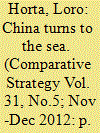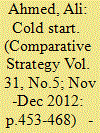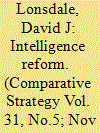| Srl | Item |
| 1 |
ID:
116347


|
|
|
|
|
| Publication |
2012.
|
| Summary/Abstract |
As China's economy continues to expand, its policies and interests change and evolve. Today, Chinese economic and political interests span the globe from Africa to Latin America and the South Pacific. The country has grown more dependent on foreign energy sources in once marginal places such as Angola. Access to resources such as oil and natural gas are now at the forefront of Chinese security policy. While access to markets and regions where massive Chinese investment is occurring is equally important, these new challenges have led to some important changes in China's security and military posture, particularly its naval strategy. While diplomacy and economic power are still the most practical alternatives available to China to defend its interests, several Chinese military and civilian observers now openly discuss other alternatives, such as the eventuality of using military power to defend these interests. This is particularly visible in the People's Liberation Army Navy, where a more ambitious and confident maritime strategy is now being discussed.
|
|
|
|
|
|
|
|
|
|
|
|
|
|
|
|
| 2 |
ID:
116351


|
|
|
|
|
| Publication |
2012.
|
| Summary/Abstract |
India's conventional war doctrine has been extensively discussed over the past decade. It has been dubbed Cold Start, though the term has been dropped from usage recently. The article discusses India's limited-war doctrine in its origin, impetus behind it, tenets, and reasons for the current distancing from the doctrine. The doctrine was India's rekindling of its conventional deterrent in the face of Pakistani subconventional proxy warfare. Its implications in terms of escalation possibilities to the nuclear level attracted considerable attention. Its "quick on the draw" nature added to concerns on crisis stability. These conspired to shift the latest doctrinal movement in India away from default reliance on traditional conventional operations to a proactive strategy that includes in addition punitive military response options.
|
|
|
|
|
|
|
|
|
|
|
|
|
|
|
|
| 3 |
ID:
116346


|
|
|
|
|
| Publication |
2012.
|
| Summary/Abstract |
A commonly held view is that nonstate actors cannot be deterred. A historical review of deterrence vis-à-vis nonstate actors, however, shows that deterrence can be applied successfully to terrorist groups for some purposes and at some times. An examination of the sensitivities, vulnerabilities, and other characteristics of the core al-Qa'ida group suggests a combination of denial and punitive deterrent measures could be used to discourage this nonstate actor from attempting a mass-casualty attack.
|
|
|
|
|
|
|
|
|
|
|
|
|
|
|
|
| 4 |
ID:
116348


|
|
|
|
|
| Publication |
2012.
|
| Summary/Abstract |
How can states that are the targets of terrorism best persuade sponsors to cease? Case studies comparing American and Soviet responses to Cuban sponsorship of terrorism support the hypothesis that states sponsor terrorism because they are motivated for conflict but constrained against it, and because they lack accountability. To hold sponsor states accountable, target states must have knowledge, capability to sanction, a clear commitment, and credibility. Because sponsor states have few ties with their targets, they are less vulnerable to the sanctions of target states. Target states thus may wish to develop stronger relationships with the peers of sponsor states.
|
|
|
|
|
|
|
|
|
|
|
|
|
|
|
|
| 5 |
ID:
116349


|
|
|
|
|
| Publication |
2012.
|
| Summary/Abstract |
In recent years the intelligence communities of the United States and the United Kingdom have faced a rapidly changing security environment. In that time, a number of high-profile failures have exposed weaknesses within these communities and how they perform their tasks. This article analyses these failures, identifying the key problems, and examines the various reforms designed to overcome the identified weaknesses. These reforms are discussed in three categories: structural change, budget increases, and increased oversight procedures. The article concludes with an assessment of whether said reforms have produced intelligence communities ready for the new security environment.
|
|
|
|
|
|
|
|
|
|
|
|
|
|
|
|
| 6 |
ID:
116350


|
|
|
|
|
| Publication |
2012.
|
| Summary/Abstract |
The U.S.-Russian impasse over the Obama missile defense plan for Europe is a composite of both technology and politics. Russian threat assessments offer a pessimistic view of NATO enlargement into former Soviet security space and the deployment of any missile defense elements there. Russian objections to NATO European missile defenses have an aspect of attempted "reflexive control" over foreign and domestic audiences, but analysis shows that U.S. and NATO missile defenses even if improved are unlikely to pose a threat to Russia's strategic nuclear deterrent.
|
|
|
|
|
|
|
|
|
|
|
|
|
|
|
|